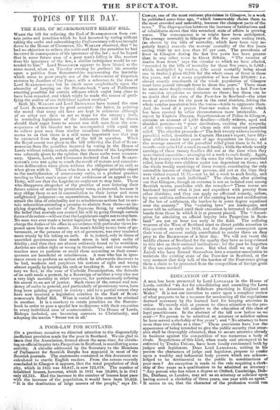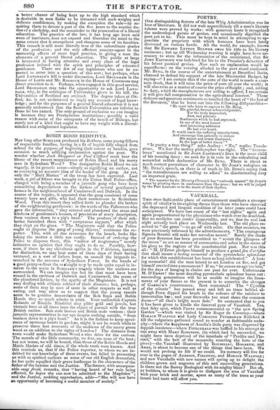EDUCATION OF ATTORNIES.
A rum has been presented by Lord LANGDALE in the House of Lords, entitled "an Act for consolidatiug and amending the Laws relating to Attornies and Solicitors practising in England and Wales." It is not our intention to enter upon a complete review of what purports to be a measure for condensing all the regulations deemed necessary by the learned lord for keeping attornies in order. We merely wish at present to direct attention to the pro- visions made in the bill relative to the education of this class of legal practitioners. In the abstract of the bill now before us we read—" No person to be admitted an attorney or solicitor unless he have served a clerkship of five years"; and " No attorney to have more than two clerks at a time." These provisions have less the appearance of being intended to give the public security that atter- Mes shall be thoroughly educated, than to secure attornies already in business against the competition of too numerous a body of rivals. Regulations of this kind, when made and attempted to be enforced by Trades Unions, have been loudly condemned both by judges and legislators. Does Lord LABGBALE, uniting in his person the characters of judge and legislator, propose to confer upon a wealthy and influential body powers which are acknow- ledged to be detrimental to the public in combinations of poor men ? An exception is made to the rule requiting a clerk- ship of five years as a qualification to be admitted an attorney : "Any person who has taken a degree at Oxford, Cambridge, Dub- lin, Durham, or London, may act as an attorney or solicitor upon having served a: clerkship of three years, one year with an agent." It seems to us, that the character of the profession would run a better chance of being kept up to the high standard which is desirable in men liable to be intrusted with such weighty and delicate confidences, by making the exception the rule—by re- quiring them to devote a part of the five years to the routine du- ties of a clerkship, and the remainder to the prosecution of a liberal education. The practice of the law, it has long ago been said even of barristers, does not expand and liberalize the mind to the same extent that it strengthens and sharpens some of its faculties. This remark is still more literally true of the subordinate grades of the profession ; and the only efficient counter-agent to the narrowing effects of mere legal practice, is giving a man the elements of a general liberal education. The public at large is interested in having attornies and every class of the legal profession imbued with the spirit and principles of educated gentlemen. There are few of our legislators who can be ex- pected to enter into a question of this sort ; but perhaps, when Lord LANGDALE'S bill is under discussion, Lord BROUGHAM in the House of Lords and Mr. ROEBUCK in the House of Commons may direct attention to it. Perhaps, when engaged in this good service, Lord BROUGHAM may take the opportunity to ask Lord LANG- DALE, why, in the catalogue of Universities given in his bill, the Universities of Scotland are omitted. The degree taken at Ox- ford, &c. is not understood to imply any amount of legal know- ledge ; and for the purposes of a general liberal education it is not generally understood that the Scottish Universities are inferior to those he has named. The only ground of exclusion we can imagine is because they are Presbyterian institutions ; possibly a valid reason with some of the occupants of the bench of Bishops, but surely not of a kind that ought to have any weight with a liberal- minded and enlightened legislator.



























 Previous page
Previous page